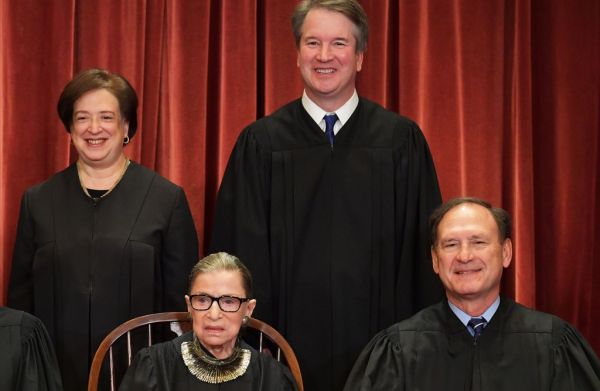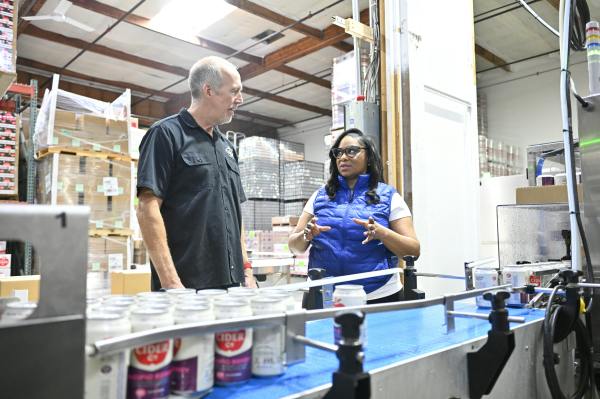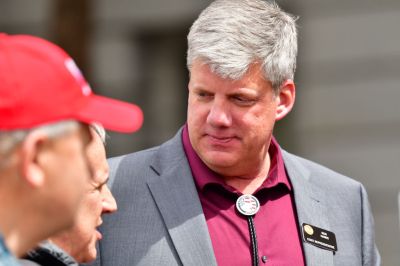Happy Monday! High temperatures in Washington have been relentless, and even Honest Abe is feeling the heat.
Up to Speed
- Former President Donald Trump told reporters before his rally in Philadelphia Saturday that he has decided on his running mate, adding that the pick has not yet been notified of his decision. His comments come a day after NBC News reported Trump narrowed his vice presidential shortlist down to two lead contenders—North Dakota Gov. Doug Burgum and Ohio Sen. J.D. Vance—while Florida Sen. Marco Rubio also remains in discussion as a potential choice. Trump is expected to announce his pick shortly before or at the Republican National Convention in Milwaukee, which starts July 15.
- Rep. Ronny Jackson of Texas—who served as White House physician for both Trump and former President Barack Obama—said on Fox News’ Sunday Morning Futures that he will demand President Joe Biden take a drug test, looking specifically for “performance-enhancing drugs,” before the Thursday presidential debate. “We’ve seen recently in his State of the Union address that there was a Joe Biden that came out that was not similar at all to what we see on a day-to-day basis for the last three and a half years. And there’s no way to explain that other than he was on something, that they’ve given him medication.” Jackson went on to suggest that the president’s team is testing what drugs to give him as he spends the week before the debate at Camp David. Trump has also said that he would demand a drug test.
- Progressives led by Vermont Sen. Bernie Sanders and New York Rep. Alexandria Ocasio-Cortez rallied in the Bronx on Saturday to boost momentum for embattled New York Rep. Jamaal Bowman ahead of his Democratic primary election this Tuesday. Bowman, the two-term incumbent from New York’s 16th Congressional District, faces a strong intra-party challenge from moderate Westchester County Executive George Latimer, with the contest’s only independent poll showing Latimer as the frontrunner. The race for the solid blue seat has become a focal point of disputes among Democrats over support for Israel in their war against Hamas as pro-Israel groups have spent millions to deny Bowman, a staunch critic of Israel, another two years in Congress.
- The Democratic Congressional Campaign Committee will increase its abortion messaging on Monday, the second anniversary of the overturning of Roe v. Wade, hitting vulnerable Republicans for their comments praising the decision, Axios reported. “Over the next five months, we will ensure the American public does not forget that it was House Republicans who praised Donald Trump’s Supreme Court for ending reproductive freedom as we know it,” committee spokesman Justin Chermol told the outlet. The committee will send mobile billboards to the districts of five House Republicans—Reps. Michelle Steel, Nick LaLota, Brandon Williams, Lori Chavez-DeRemer, and Scott Perry—in tough races, displaying their statements.
- That campaign comes at a time when a coalition of pro-abortion groups is planning a 10-year, $100 million effort to restore a right to abortion at the federal level, Politico reported Monday. Planned Parenthood, the ACLU, Reproductive Freedom for All, and other actors will form the campaign under the banner Abortion Access Now. “We are operating with a really big vision, but we’re also living in the world of the possible,” Unite for Reproductive and Gender Equity Executive Director Kimberly Inez McGuire told the outlet. “Our goal, really, is to galvanize what is currently a national outrage over abortion bans into action—into a mass movement.”
Colorado’s Ron Hanks Gets Democratic Support … Again

Democrats are once again spending big money on ads to boost a “Stop the Steal” Republican primary candidate over a more electable Republican, this time in Colorado.
Local attorney Jeff Hurd is the leading Republican to represent Colorado’s 3rd Congressional District, topping six GOP primary candidates with 27 percent in the only public poll of the race ahead of the June 25 primary. His closest rival is former state Rep. Ron Hanks, who has just 9 percent. But a left-wing political group and the presumptive Democratic nominee have together spent around half a million dollars on ads to bolster Hanks—an extremist who still maintains Joe Biden lost the 2020 election and who had raised less than $18,000 as of a filing earlier this month.
Rocky Mountain Values PAC has spent about $400,000 on TV, mail, and radio ads raising Hanks’ profile, with one calling him “too conservative for Colorado.” Additionally, the campaign of former Aspen City Councilman Adam Frisch—who is running unopposed in the Democratic primary—has spent at least $100,000 to air an ad that says Hurd is “hiding” and won’t give his position on certain issues, such as his level of support for former President Donald Trump.
The national Democratic party views the seat as a key pick-up opportunity, particularly after Frisch lost his 2022 race against the district’s current congresswoman, Rep. Lauren Boebert, by just over 500 votes. Now that Boebert has decided to run for an open seat in the 4th District to improve her electoral chances, Democrats look to be using part of the more than $14 million Frisch has raised so far to influence Republican voters.
Democratic meddling in GOP primaries to boost fringe candidates to run against in the general is nothing new. During the 2022 midterms, Democrats boosted primary challengers to Republicans who voted to impeach Trump after the January 6 riot—such as John Gibbs, who successfully primaried Rep. Peter Meijer before losing in the general election, and Chris Mathys, who unsuccessfully challenged Rep. David Valadao. Statewide primary candidates such as Pennsylvania’s Doug Mastriano and Ron Hanks himself also received support.
Outside of a couple of instances, the party has avoided this strategy this cycle after Democratic Congressional Campaign Committee chair Rep. Suzan DelBene denounced the tactic in January.
Back in 2022, Hanks made the “Stop the Steal” movement a centerpiece of his Senate run. (His 2022 campaign began with a video of him blowing up an office copier labeled “Dominion Voting Machine.”) Two years later, his House run sounds remarkably similar. “Joe Biden is a fraudulently installed agent of a foreign power, period,” he told Dispatch Politics in an interview. “He’s been a garbage human being since he first entered politics, and he’s been a disgrace to his family name. I can’t wait to see the man gone. He’s one of the most hateful, spiteful human beings. He did not outperform President Trump in 2020.”
Hanks added that the “foreign power” consisted of “globalists and China,” as well as “whoever’s controlling this world government,” with “Barack Hussein Obama” likely being an “intermediary.” Days before his primary he attended what he described to Dispatch Politics in a text message as “an event for the families of the Jan6 political prisoners” at a Trump property in New Jersey.
“This is about American Freedom. I will travel the world to protect it and to spread the word,” he told Dispatch Politics when asked why he was not in his district days before the primary.
Hurd, who identifies as a “constitutional conservative,” is the former chair of the chamber of commerce in the district’s second-largest city, Grand Junction. In an interview with Dispatch Politics, Hurd demurred when asked if he supported Trump in his previous two runs for the White House and if he plans to do so this fall.
“I usually don’t talk about who I voted for or who I’m planning to vote for, other than to say I’m a conservative Republican—and have been consistently—and voted Republican. But I think what happens is, with that question, people are trying to ask, ‘What tribe are you in?’ And I guess I resist that sort of pull, and I say, ‘Look, I'm on the side of the 3rd Congressional District.’”
He added that Democratic opposition to his campaign shows he’s the stronger candidate to beat Frisch.
“I think the goal is from the Democratic playbook, which is to pull the weaker candidate in the primary across the finish line so that they can be easily defeated in the general,” Hurd said. “And I think the fact that these groups are coming after me, that Adam Frisch, the Democrat, is coming after me, goes to show that I’m the guy they’re afraid of. I’m the only candidate who’s running a serious and effective campaign.”
Conservative groups have also spent money to counter Hanks’ run. The Congressional Leadership Fund (CLF), a super PAC aligned with Speaker of the House Mike Johnson, has taken a similar line to Hurd’s in spending about $410,000, with one ad painting Hanks as a “liberal” who “abandoned President Trump.” “Locked, loaded, liberal. Ron Hanks: a bullseye for liberals, a misfire for Colorado,” the ad’s voiceover says.
“The Democrats’ ads against me were at least factual that, hey, I'm conservative, I stand with Donald Trump,” Hanks said about the CLF ad. “This trash from the deep-state Republicans and the establishment Republicans are just flat lies. And the fact that I was ever a liberal is simply untrue.”
Rocky Mountain Values PAC also took issue with the content of the CLF ad. Last week the liberal group sent a cease-and-desist letter, which Dispatch Politics obtained, to local stations that aired the ad, calling the claim that Hanks abandoned Trump “an apparent attempt to mislead Colorado voters into thinking that Mr. Hanks is not an extremist MAGA politician.”
CLF, for its part, claimed the letters proved Democrats want Hanks to win the nomination.
“Democrats are so desperate to nominate Ron Hanks, they’re actually sending cease and desist letters on his behalf now,” CLF Communications Director Courtney Parella told Dispatch Politics.
Rocky Mountain Values PAC and the Frisch campaign did not respond to Dispatch Politics’ requests for comment. But a spokeswoman for the super PAC told The Hill voters should “know the truth about who the two leading Republican candidates are for this open congressional seat.” A representative from the Frisch campaign made similar remarks, saying of Hurd and Hanks, “I’m tired of watching Adam take shots from both of them. As far as I’m concerned, the general election has started.”
The Race to Pick Mitt Romney’s Successor
The race to succeed Sen. Mitt Romney will become clearer after Utah Republican voters choose their nominee in this Tuesday’s primary.
Four-term congressman and relative moderate Rep. John Curtis leads the pack. His top rival is Trent Staggs, the mayor of Riverton (a suburb of Salt Lake City) who has been endorsed by former President Donald Trump and who won the state party’s support in a nonbinding convention earlier this year. Curtis is well-funded and has spent more than $3.5 million on his campaign, four times more than Staggs.
According to an early June poll commissioned by the Deseret News and the University of Utah’s Hinckley Institute of Politics, 34 percent of registered Utah Republicans support Curtis while 16 percent back Staggs. Two other candidates on the ballot—former state House Speaker Brad Wilson and businessman Jason Walton—polled at 12 percent and 4 percent, respectively. Thirty-three percent of voters said they were undecided, though when asked to choose a preferred candidate, they boosted Curtis to 47 percent and Staggs to 21 percent.
The winner of the primary is expected to handily defeat Caroline Gleich, a professional ski mountaineer and the only declared Democratic candidate for Senate.
The candidates are vying for an open Senate seat after Romney announced in September he would not seek a second term. The 77-year-old Romney cited his age as motivation to leave office, but the 2012 Republican presidential nominee also has been a frequent critic of Trump and was the only GOP senator to vote to convict him in both of the former president’s impeachment trials.
Tuesday’s primary will test whether candidates in Romney’s mold still appeal to Republican voters in the Beehive State. While Romney’s team has said he will not back a successor, other members of Utah’s congressional delegation—including fellow Utah Rep. Blake Moore and former Rep. Chris Stewart—have endorsed Curtis. On Capitol Hill, Curtis is a member of both the moderate Main Street Partnership and the conservative Republican Study Committee. Like Romney, he supported codifying same-sex marriage into federal law and promoted action to address climate change as founder and chair of the Conservative Climate Caucus. But, unlike Romney, Curtis opposed both Trump impeachments.
While Utah has been less receptive to Trump than other red states, the former president’s endorsement of Staggs in April elevated him almost overnight. The Riverton mayor entered the race in May 2023 as a pro-Trump challenger to Romney before the incumbent announced his retirement. On the day Trump endorsed him in a Truth Social post, Staggs won over 69 percent of delegates at the Utah GOP convention, gaining him the party’s endorsement and a place on the primary ballot. (Curtis placed a distant second place at the convention but had already gathered enough signatures to make it onto the primary election ballot.)
Yet Staggs’ landslide victory at the convention did not make him the automatic favorite for the primary. Jason Perry, director of the Hinckley Institute, told Dispatch Politics that he does not expect the convention result to affect Tuesday’s election significantly. “In Utah historically, a more conservative candidate wins at convention and a more moderate Republican wins the primary,” said Perry.
Perry also highlighted Utah’s cool reaction to Trump’s political rise in the past decade. “Utah is a center-right state,” he said. “A Trump endorsement holds less weight here.”
Nonetheless, Curtis and Staggs have both portrayed themselves as strong conservatives focused on inflation, immigration, and standing against federal interference on Utah’s vast public lands. However, Staggs has targeted Curtis throughout the race, aggressively painting him as an establishment anti-Trump “Mitt Romney 2.0.”
At a June 10th televised debate, Staggs accused Curtis of insider trading, pointing to Curtis’ purchase of Abbott Laboratories stock the same day the Food and Drug Administration approved a coronavirus test developed by the company. Curtis denied improper behavior, calling Staggs’ charge “a low shot.”
Both campaigns say they are confident ahead of the primary Tuesday. “Campaigns are a math game,” Corey Norman, a Curtis aide, told Dispatch Politics. “I have not seen a poll that has [Curtis] below 35 percent. If he gets 35 percent, someone else will have to get about 54 percent of the remaining vote”—an unlikely scenario in a field of four candidates, Norman says.
In an interview with Dispatch Politics, Staggs said he is hopeful his message will resonate with undecided voters by Tuesday. “Curtis has a high name ID. Voters are not undecided because they don’t know who he is. They are looking for an alternate candidate.” Staggs said. “We’re very confident, we know [this race] is going to be close.”
Perry, of the Hinckley Institute, is less optimistic about Staggs’ chances. “John Curtis is in a very comfortable place right now,” he told Dispatch Politics. “There are Utahans that are still undecided, but they tend to lean towards Curtis.”
Notable and Quotable
“We’re gonna show f—ing AIPAC the motherf—ing power of the South Bronx.”
—Rep. Jamaal Bowman at a rally before his primary challenge, June 22, 2024







Please note that we at The Dispatch hold ourselves, our work, and our commenters to a higher standard than other places on the internet. We welcome comments that foster genuine debate or discussion—including comments critical of us or our work—but responses that include ad hominem attacks on fellow Dispatch members or are intended to stoke fear and anger may be moderated.
With your membership, you only have the ability to comment on The Morning Dispatch articles. Consider upgrading to join the conversation everywhere.